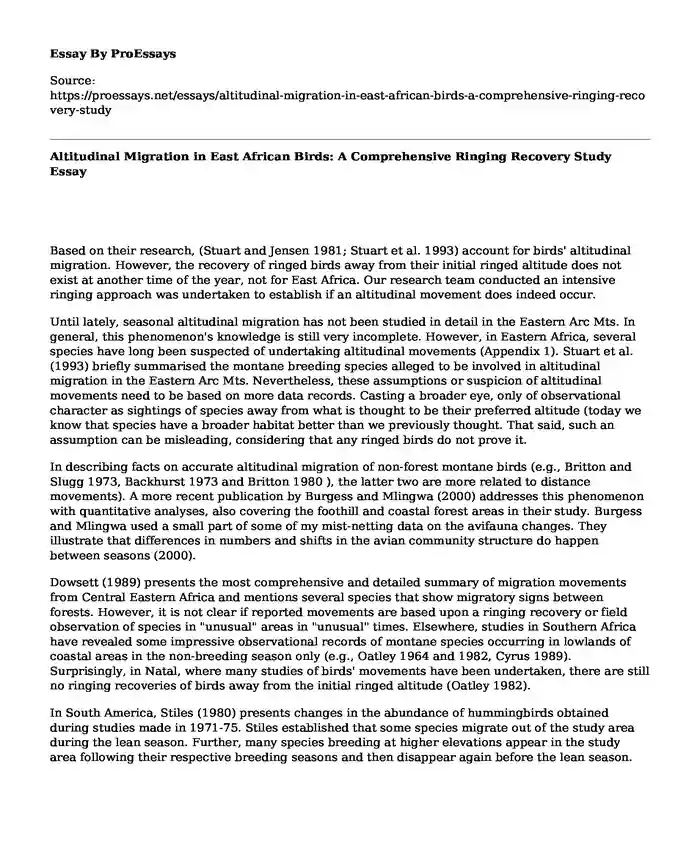Based on their research, (Stuart and Jensen 1981; Stuart et al. 1993) account for birds' altitudinal migration. However, the recovery of ringed birds away from their initial ringed altitude does not exist at another time of the year, not for East Africa. Our research team conducted an intensive ringing approach was undertaken to establish if an altitudinal movement does indeed occur.
Until lately, seasonal altitudinal migration has not been studied in detail in the Eastern Arc Mts. In general, this phenomenon's knowledge is still very incomplete. However, in Eastern Africa, several species have long been suspected of undertaking altitudinal movements (Appendix 1). Stuart et al. (1993) briefly summarised the montane breeding species alleged to be involved in altitudinal migration in the Eastern Arc Mts. Nevertheless, these assumptions or suspicion of altitudinal movements need to be based on more data records. Casting a broader eye, only of observational character as sightings of species away from what is thought to be their preferred altitude (today we know that species have a broader habitat better than we previously thought. That said, such an assumption can be misleading, considering that any ringed birds do not prove it.
In describing facts on accurate altitudinal migration of non-forest montane birds (e.g., Britton and Slugg 1973, Backhurst 1973 and Britton 1980 ), the latter two are more related to distance movements). A more recent publication by Burgess and Mlingwa (2000) addresses this phenomenon with quantitative analyses, also covering the foothill and coastal forest areas in their study. Burgess and Mlingwa used a small part of some of my mist-netting data on the avifauna changes. They illustrate that differences in numbers and shifts in the avian community structure do happen between seasons (2000).
Dowsett (1989) presents the most comprehensive and detailed summary of migration movements from Central Eastern Africa and mentions several species that show migratory signs between forests. However, it is not clear if reported movements are based upon a ringing recovery or field observation of species in "unusual" areas in "unusual" times. Elsewhere, studies in Southern Africa have revealed some impressive observational records of montane species occurring in lowlands of coastal areas in the non-breeding season only (e.g., Oatley 1964 and 1982, Cyrus 1989). Surprisingly, in Natal, where many studies of birds' movements have been undertaken, there are still no ringing recoveries of birds away from the initial ringed altitude (Oatley 1982).
In South America, Stiles (1980) presents changes in the abundance of hummingbirds obtained during studies made in 1971-75. Stiles established that some species migrate out of the study area during the lean season. Further, many species breeding at higher elevations appear in the study area following their respective breeding seasons and then disappear again before the lean season.
Conclusion
To sum up, in East Africa, there seems not to be any data proving altitudinal migration by ringing recoveries (Though Romdal did mention some results). Neither is their data published on shifts regarding seasonal changes in the forest avifauna abundance. Moreover, mountains seem to have been investigated in two subsequent non-breeding and breeding seasons for migratory studies. The data presented here will be data from an area investigated in two subsequent seasons and provide records of birds recaptured away from their initial ringed altitude.
Cite this page
Altitudinal Migration in East African Birds: A Comprehensive Ringing Recovery Study. (2024, Jan 27). Retrieved from https://proessays.net/essays/altitudinal-migration-in-east-african-birds-a-comprehensive-ringing-recovery-study
If you are the original author of this essay and no longer wish to have it published on the ProEssays website, please click below to request its removal:
- Relationship Between Man and Nature Essay Example
- Ultraviolet Radiation and Marine Photosynthesis Essay
- Paper Example on Identifying Animals With Animal Microchips: A Guide
- Exploring the Grand Canyon: Nature's Deepest Gorge - Essay Sample
- Essay Sample on Humans and Nature: A Path to Sustainability
- Genetic Engineering in Food Production: Pros & Cons - Essay Sample
- Free Essay Sample: American and Iranian Views on Resource Scarcity and Conservation







